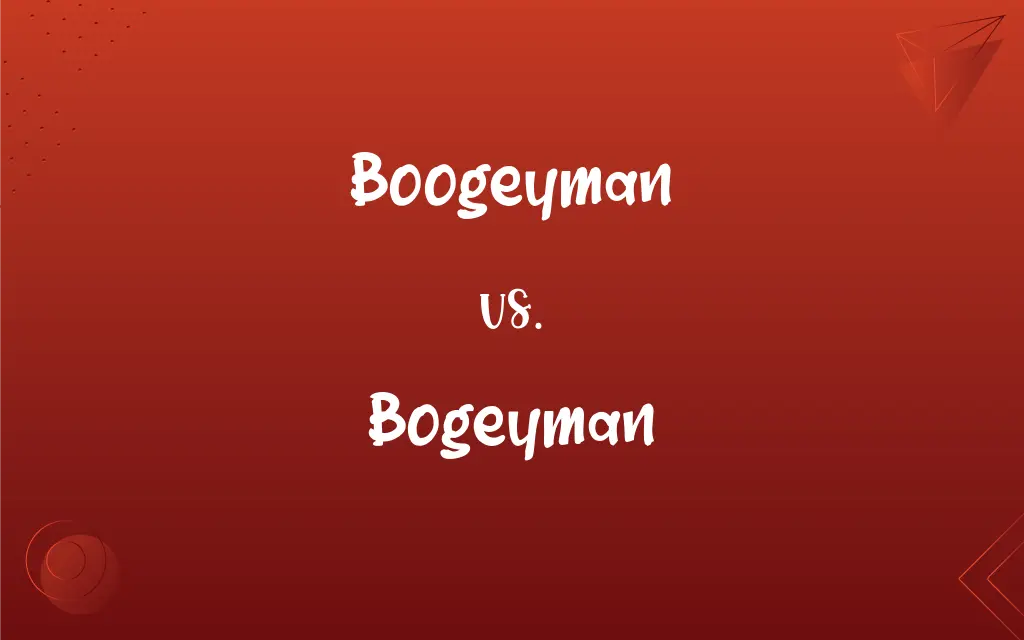Boogeyman vs. Bogeyman: What's the Difference?
By Janet White & Aimie Carlson || Updated on May 22, 2024
Boogeyman and bogeyman refer to the same mythical creature used to scare children, but "boogeyman" is more commonly used in American English, while "bogeyman" is often used in British English.

Key Differences
Boogeyman is a term primarily used in American English to describe a mythical creature that parents use to frighten children into good behavior. The boogeyman is often depicted as hiding in closets or under beds, waiting to capture misbehaving children. Bogeyman, on the other hand, is the British English variant of the same concept. The bogeyman also serves as a cautionary figure for children, ensuring they adhere to rules and behave properly. The term "bogeyman" has historical roots in British folklore, often linked to supernatural beings.
The spelling difference between boogeyman and bogeyman reflects regional language preferences rather than a change in meaning or concept. Boogeyman is favored in the United States, reinforcing its cultural relevance in American media and literature.
Bogeyman maintains its presence in British culture, appearing in stories, nursery rhymes, and folklore. The slight spelling variation does not alter the underlying idea of a malevolent figure used to control children's behavior.
Both boogeyman and bogeyman serve similar purposes across their respective cultures, illustrating the universal nature of using mythical creatures as behavioral deterrents. Despite the different spellings, the fear and mystique surrounding these figures remain consistent.
The choice between boogeyman and bogeyman often comes down to regional language norms and the audience's familiarity with either term. Writers and speakers may select the term that best fits their cultural context.
ADVERTISEMENT
Comparison Chart
Usage Region
American English
British English
Cultural Context
Common in American folklore
Common in British folklore
Spelling Variation
Extra "o" in "boogeyman"
Single "o" in "bogeyman"
Media Representation
Frequent in American media
Frequent in British media
Historical Roots
Linked to American tales
Linked to British folklore
ADVERTISEMENT
Boogeyman and Bogeyman Definitions
Boogeyman
A figure representing fear or evil.
In the story, the boogeyman lurks in the shadows.
Bogeyman
A mythical creature used in British folklore to scare children.
The bogeyman is a common character in British nursery rhymes.
Boogeyman
A symbol of unknown terror.
The legend of the boogeyman varies across cultures.
Bogeyman
A person or thing that causes fear.
In the book, the bogeyman was a symbol of dread.
Boogeyman
A phantom or monster used in tales.
The movie featured a terrifying boogeyman.
Bogeyman
An embodiment of evil in folklore.
The story's bogeyman haunted the village at night.
Boogeyman
An imaginary being invoked by adults to frighten children.
Parents often mention the boogeyman to enforce bedtime.
Bogeyman
An imaginary being used to frighten misbehaving children.
They told tales of the bogeyman to keep kids in check.
Boogeyman
A mythical creature used to scare children into good behavior.
The boogeyman will get you if you don't clean your room!
Bogeyman
A legendary figure meant to control children's behavior.
The bogeyman was said to hide under beds.
Boogeyman
A terrifying specter; a hobgoblin.
Bogeyman
Variant of boogeyman.
Boogeyman
An exaggerated or nonexistent threat used to intimidate others
“Welcome to the era of the ‘bot' as political boogeyman” (Washington Post).
Bogeyman
A menacing, ghost-like monster in children's stories.
Boogeyman
Alternative form of bogeyman
Bogeyman
(by extension) Any make-believe threat, especially one used to intimidate or distract.
Boogeyman
Something frightful, as a specter; anything imaginary that causes needless fright; something used to excite needless fear; also, something really dangerous, or an imaginary monster, used to frighten children, etc.
Bogeyman
A goblin; a bugbear; a bogey{1}. This is the form used by parents to frighten children; as, if you don't eat your vegetables, the bogeyman will get you.
Boogeyman
An imaginary monster used to frighten children
Bogeyman
An imaginary monster used to frighten children
FAQs
Does the bogeyman appear in British tales?
Yes, the bogeyman is frequently mentioned in British folklore and nursery rhymes.
Is the boogeyman used in American folklore?
Yes, the boogeyman is a common figure in American folklore and stories.
What is the main difference between boogeyman and bogeyman?
The primary difference is regional usage: "boogeyman" in American English and "bogeyman" in British English.
Can the terms boogeyman and bogeyman be used interchangeably?
They can be used interchangeably, but it's best to use the term that fits the regional context.
Do children still fear the boogeyman today?
While the fear may not be as widespread, the boogeyman is still a powerful cultural symbol.
Do boogeyman and bogeyman mean the same thing?
Yes, both terms refer to a mythical creature used to scare children into good behavior.
Why are there different spellings for the same concept?
The spelling difference reflects regional language variations between American and British English.
Are there any other names for the boogeyman?
Yes, various cultures have different names for similar mythical creatures.
Is the concept of the boogeyman universal?
The concept of a frightening figure used to control children's behavior is found in many cultures.
How is the boogeyman used in modern media?
The boogeyman appears in movies, books, and TV shows as a symbol of fear.
Are boogeyman and bogeyman depicted differently in stories?
Generally, they are depicted similarly as frightening figures, with minor cultural differences.
Which term is more common in American English?
"Boogeyman" is more commonly used in American English.
Is the boogeyman always portrayed as male?
The boogeyman is typically male, but some variations exist.
Can the term boogeyman refer to real people?
Occasionally, it is used metaphorically to describe a threatening person or situation.
Which term is more common in British English?
"Bogeyman" is more commonly used in British English.
Is there any historical basis for the boogeyman?
The boogeyman likely evolved from various folklore and cautionary tales.
Do adults believe in the boogeyman?
Generally, adults do not believe in the boogeyman, but they use the concept to influence children.
Are there psychological reasons for the boogeyman myth?
The boogeyman myth can be seen as a way to enforce social norms and control behavior.
What other cultures have similar figures to the boogeyman?
Many cultures have similar figures, such as the "El Coco" in Spanish folklore.
Has the concept of the boogeyman changed over time?
While the core idea remains, the boogeyman's portrayal has evolved with cultural changes.
About Author
Written by
Janet WhiteJanet White has been an esteemed writer and blogger for Difference Wiki. Holding a Master's degree in Science and Medical Journalism from the prestigious Boston University, she has consistently demonstrated her expertise and passion for her field. When she's not immersed in her work, Janet relishes her time exercising, delving into a good book, and cherishing moments with friends and family.
Co-written by
Aimie CarlsonAimie Carlson, holding a master's degree in English literature, is a fervent English language enthusiast. She lends her writing talents to Difference Wiki, a prominent website that specializes in comparisons, offering readers insightful analyses that both captivate and inform.































































